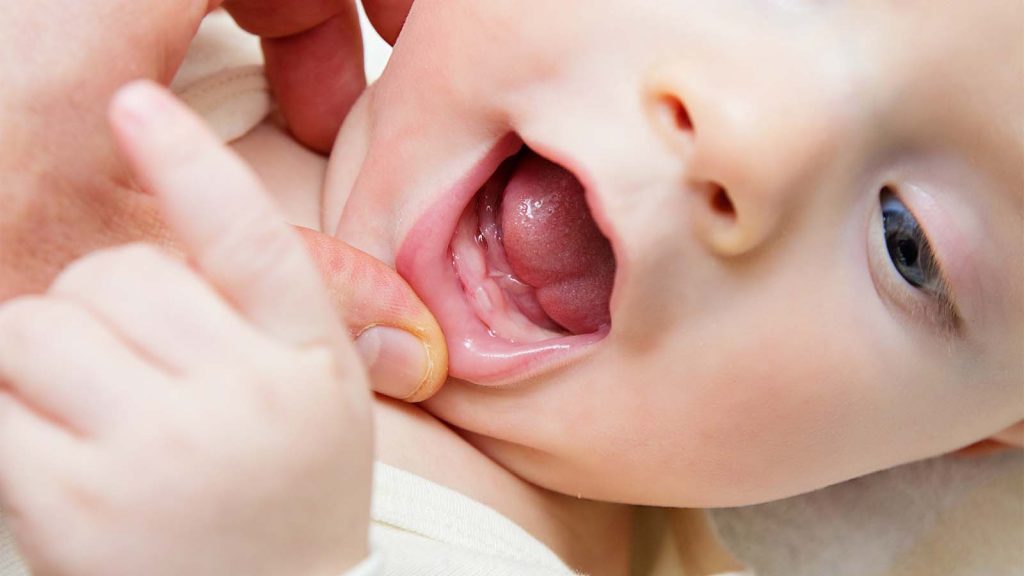Normally babies are born without teeth. Some normal newborns may have natal teeth and usually they are not supernumerary teeth (abnormal additional teeth). If you notice that your baby has natal teeth, it is important for the baby to have a dental check up to find out if tooth extraction is necessary.
When New Year is just around the corner, everybody is busy shopping and cleaning their house while two parents came to my clinic with their newborn baby seeking for help. They were worried because their newborn baby had tooth eruption 3 days after she was born. The parents were superstitious, thinking that a newborn baby that has teeth will harm the parents and tooth extraction is necessary in order to prevent this incident.
Tooth extraction is only necessary for supernumerary tooth
Babies normally have their lower central incisors erupting at the age of 6 to 7 month. However,it is also possible for newbornsto have 1 or 2 lower central incisors erupting as soon as after birth or within a month after birth.
These newborn teeth are classified as natal teeth. Sometimes,these early erupted teeth are supernumeraries (abnormal additional teeth which are not the child’s milk teeth) and they come in pairs.They are commonly found on the lower anterior portion where the lower central incisor teeth will appear. They appearabnormal with sharp and thin shape and the tooth enamel may be dysplastic. Because of their shape, they may cause irritation and injury to the infant’s tongue and lingual frenum when nursing. They may also hurt the mum’s nipple while nursing. Natal teeth have short roots and are attached to the gum by soft tissue and are often wobbly. If the tooth is loose, the child has a risk of aspiration, or “breathing in” the tooth. In this case, it is advisable to have these teeth removed.
Usually these early erupted lower incisors (natal teeth) are normal milk teeth. It is rare for them to be supernumeraries. If you notice that your baby has natal teeth, it is important for the baby to have a dental check up to find out if tooth extraction is necessary. If these are not supernumeraries, it is better to keep them to prevent unnecessary extraction of early erupted milk teeth and affecting your child’s appearance until he or she reaches 7 to 8 years old as the permanent lower incisors only erupt at this age.
Shapes of a normal tooth
It is common when I am about to praise the kid for having good teeth the parents would question about their children having wavy incisor edge. This wavy incisor edge is normal and termed mamelon. It usually occurs at upper and lower incisors. The newly erupted teeth do not have much wear and tear, thus the mamelon is very obvious, but as we grow up, attrition increases and flattens the incisor edge.
It is better to visit the dentist as early as possible
Many parents often ask me when is the best time for their children to see a dentist. Generally, it is better to visit the dentist as earlier as possible. People can bring their kids to the dentist when the first baby tooth erupted. By having an early routine checkup, dentist could diagnose problems and treat them early as prevention is better than cure.
When children reach 1 to 2 years old, they will be curious to the things around them.At this stage, parents should set a good example to their children by going to dentist frequently and bring them along so that they have a head start of what it is all about in dental checkups. Treatment is not necessary during a child’s first visit to the dentist but a general dental examination can be done when your child is ready.
The comprehension of children less than 3 years old is limited. So, during their first dental checkup, the dentist usually just inserts mouth mirror and probe inside the mouth of the child, while trying to build the child’s confidence and patience to cooperate with the dentist. For more advance clinics, the dentist will insert intra oral camera for the children will be able to see the images of their teeth through a monitor or television. This makes the whole process more interesting. If you always bring your child for routine dental checkup, your child is unlikely to get serious teeth problems. With easier and painless treatment, your child will not fear dentist anymore!





